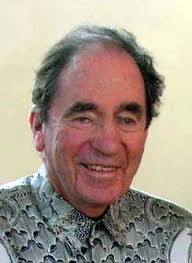
BY MITCHELL HIGHTOWER
In November of 1991, Albie Sachs found himself in his car sweating. It was his first time behind the wheel of a car since the loss of his right arm (lost to a bomb planted in his car by an agent of the apartheid government in 1988) as well as his first time attending a gay pride march. “I wish there was a ‘straight man for gay rights’ sign,” he remembers thinking, though he eventually overcame his anxiety and participated in the event. This experience exemplified Sach’s life of activism and justice-seeking, which culminated in a term on the South African Constitutional Court from 1994 to 2009.
The longtime activist and former South African Constitutional Court Justice used this anecdote to begin his discussion the evening of October 15, “The Sacred and the Secular: South Africa’s Constitutional Court Decision on Same Sex Marriages.” In his talk, Sachs discussed the same-sex marriage cases that came before him, his response, and his feelings on his country’s present and future human rights situation.
“We establish precedent, we don’t rely on precedent,” Sachs says of the constitutional court, still only about two decades old. A new and open system following liberation from the apartheid government meant “a new way of looking at things.” Perhaps it was this new perspective that contributed to the progressive ruling eight years ago.
The court was first pushed to take its progressive stance in 2005, when a case was brought to the court by two women who had been in a ten-year relationship, and despite the post-apartheid era constitutional ban on discrimination based on sexual orientation, were barred from legal marriage. The lobbying group the Lesbian and Gay Equality Project backed their efforts to achieve a legal marriage.

When discussing the case, the Consitutional Court Justices were in agreement on the point that the denial of union rights to same-sex partners was discrimination. They could not, however, so easily give a ruling due to what Sachs calls “the question of the ‘m-word.’” Christian groups, particularly the Catholic-sponsored Family Alliance Group, were urging the court to rule in support of civil unions for homosexual couples, equal to marriages in all but the name, which in their view was too deeply connected with the church.
In the judges’ mind, however, the barring of marriage from one group was discrimination, and resolution required a decision between “equality of the vineyard,” equalizing society through upgrading a group’s status, or “equality of the graveyard,” equalizing down.
The court chose the vineyard. The nine justices would unanimously rule in favor of the legalization of same-sex marriage, and demand that within a year Parliament revise legal statutes to allow it. Sachs wrote the court’s decision, and dealt with the idea of “separate but equal,” stating that the granting of marriage rights is “question of dignity.” He also emphasized the importance of separation of the judiciary and religion. “Religious leaders have problems enough themselves with religious questions…Imagine if judges got involved,” he says. He remains convinced that “the values of the faith community” cannot be used to determine the values of society at large.
8 years later, Sachs seems hopeful about the situation in South Africa with regard to human rights. “I wish I could say it was the end of homophobia, but I can’t,” he says, though he happily observes that at least some are able to proceed with their lives unimpeded by the law. “The more banal things are, the happier I am,” he says. Marriages are handled as pedestrian matters, sometimes written up in the papers “and no walls have come falling down.”
Meanwhile, he believes corruption and safety to be South Africa’s greatest current challenges. However, he sees , significant progress in several other areas of society, such as housing and utility availability. As a new generation begins to take on these challenges, Sachs has one main bit of advice. “I just hope the young people are just as irreverent, as cheeky, and demanding as we were when we were young.”
Mitchell Hightower is a freshman in Branford College. Contact him at anthony.hightower@yale.edu.